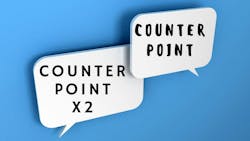Letter to the editor: Recent counterpoint on DDH Compact contains inaccuracies
Dear RDH,
We read with interest your article Counterpoint: DDH Compact and license reciprocity dated March 27, 2024, that presented a perspective by Diane Klemann, BA, RDH, LAP, on the Dentist and Dental Hygienist Compact. She was reacting to the January 9, 2024, article written by Jessica Thomas of the Council of State Governments (CSG) Center for Interstate Compacts, DDH Compact: Working toward dentist and dental hygienist license reciprocity across state lines. Unfortunately, a number of inaccuracies included and published in Ms. Klemann’s counterpoint require clarification.
Representing just a portion of the national organizations who have collaborated on the DDH Compact for over five years—JoAnn Gurenlian, PhD, MS, RDH, AAFAAOM, FADHA, ADHA Director for Education, Research & Advocacy; Sarah Ostrander, MS, DHSc, RDH, Senior Manager, Dental Education and Licensure and Coalition for Modernizing Dental Licensure, and Matt Shafer, MPA, Deputy Program Director at CSG—we feel it is our responsibility to ensure that your readers receive accurate and factual information about this legislative progress that will advance the dental and dental hygiene professions.
The counterpoint article states, “The Council of State Government’s (CSG) Compact…does not require a Commission on Dental Accreditation (CODA)-accredited program as an educational foundation (by leaving the door open for now-undefined accreditors) ...” This is untrue. Specifically, the compact allows for an accrediting agency recognized by the United States Department of Education (USDOE) for the accreditation of dentistry and dental hygiene education programs. The USDOE has not approved any dentist and dental hygiene accrediting agency other than CODA. The language in the compact is written future-facing, should CODA undergo a name change or another agency is ever approved by the USDOE for the dental professions.
The counterpoint article also emphasizes that the compact “could permit those with discipline problems and criminal convictions to practice where otherwise disallowed.” This is also inaccurate because the DDH Compact requires a dentist or dental hygienist to have an unencumbered license and complete a background check in order to practice under the compact. That means no one with current discipline problems or disqualifying criminal convictions would receive compact privileges.
Throughout the article, there are numerous references to the “CSG Compact.” The DDH Compact is not owned by CSG. CSG facilitated the drafting process as they have for all existing licensure compacts across various professions. Characterizing the compact this way creates a false perception that it is being forced onto the dental and dental hygiene professions. The compact is, in fact, owned by the member states who work to enact the legislation. The DDH Compact is endorsed and supported by a broad coalition of national organizations with the professions including the ADA, ADHA, ADSO, ADEA, ASDA, AAE, and AAO, as well as the DoD.
We appreciate the importance of individuals educating themselves on the issues surrounding licensure portability and encourage everyone to learn the facts by visiting ddhcompact.org.
Sincerely,
JoAnn Gurenlian, PhD, MS, RDH, AAFAAOM, FADHA
Director of Education, Research & Advocacy
American Dental Hygienists’ Association
Sarah O. Ostrander, MS, DHSc, RDH
Senior Manager, Dental Licensure & Education and Coalition for Modernizing Dental Licensure
American Dental Association
Matt Shafer, MPA
Deputy Program Director | National Center for Interstate Compacts
The Council of State Governments
